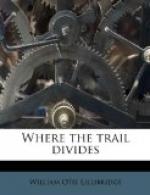“I met him last, night, you say?” It was the hesitating voice of one whose memory is treacherous, “I have been trying to recall—Certainly you must be mistaken. I saw no one last night except Uncle Landor and an Indian cow-puncher with a comic opera name.” He met the brown eyes that were of a sudden turned upon him, frankly, innocently. “You must be mistaken,” he repeated.
Searchingly, at first suspiciously, then hesitatingly, with a return of the colour that came as easily as a prairie wind stirs the down of a milk-weed plant, Elizabeth Landor returned his look. It was an instinct that at last caused her eyes to drop.
“No, I was not mistaken,” she voiced. “How Landor is an Indian. It is he I meant.”
For a carefully timed pause, the space in which one recovers from hearing the unbelievable, Craig was silent; then swiftly, contritely he roused. “I beg a thousand pardons,” he apologised. “I meant no disrespect. I never dreamed—Forgive me.” He had drawn very near. “I wouldn’t hurt you for the world. I—Please forgive me.” He was silent.
“There’s nothing to forgive.” The girl’s colour was normal again and she met his eyes frankly, gravely.
“But there is,” protested the man humbly. “Because he happened to be minus a collar and had a red skin—I was an ass; an egregious, blundering ass.”
“Don’t talk that way,” hurriedly. “You merely did not know him, was all. If you had been acquainted all your life as I have—” Against her will she was lapsing into a defence, and she halted abruptly. “You were not at fault.”
Again for a carefully timed pause the man was silent. Then abruptly, obviously, he changed the subject.
“You said you were going away,” he recalled. “Is it to be a wedding journey?”
“Yes,” tensely.
“Tell me of it, please; I wish to hear.”
“You would not be interested.”
“Elizabeth—” syllabalised, reproachfully. “Am I not your cousin?”
No answer.
“Haven’t you forgiven me yet?” The voice was very low. Its owner was again very near.
“You’d laugh at me if I told you,” repressedly. “You wouldn’t understand.”
Slowly, meaningly, Clayton Craig drew away—resumed the former position; the place from which, unobserved, he could himself watch.
“We’re going away out there,” complied the girl suddenly, reluctantly. Her hand indicated the trackless waste to the right. “Just the two of us are going: How and I. We’ll take a pack horse and a tent and How’s camp kit and stay out there alone until winter comes.” Against her will she was warming to the subject, was unconsciously painting a picture to please the solitary listener. “We’ll have our ponies and ammunition and plenty to read. The cowboys laugh at How because ordinarily he never carries a gun; but he’s a wonderful shot. We’ll have game whenever we want it. We’ll camp when we please and move on when we please.” Again




